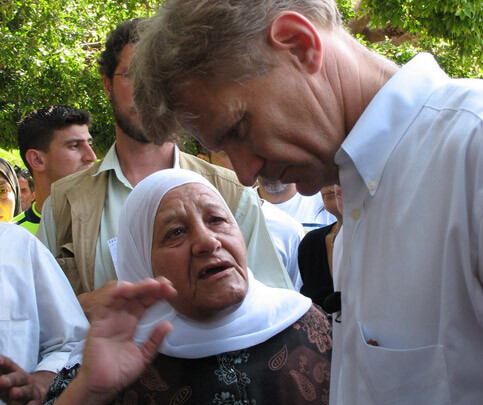IRIN 23 July 2006

The UN’s aid chief is visiting Lebanon as part of a trip that will also take him to Israel on Monday. He is trying to persuade Israel to open humanitarian corridors. (IRIN)
BEIRUT - The UN’s Emergency Relief Co-ordinator, Jan Egeland, is asking for money from the international community to help the UN aid to Lebanon. “Even if the fighting stops tomorrow, the needs will go on for months and months and months,” he told a press conference in Beirut on Sunday.
Egeland briefly toured a Beirut hospital, saying he saw “too many children wounded,” including five “severely wounded” children and their parents. “The father is a taxi driver whose legs were amputated,” Egeland said, giving reporters a rare glimpse of the kind of casualties doctors in Lebanese hospitals are currently dealing with.
The UN’s aid chief is visiting Lebanon as part of a trip that will also take him to Israel on Monday. He is trying to persuade Israel to open humanitarian corridors that would allow the safe delivery of aid inside Lebanon, particularly to the south.
Egeland said the fact Israel had agreed to allow the delivery of aid by sea and by air into Beirut was “good news”, but it needed to allow it to be moved within the country too. “If we cannot get it the people, it’s no use,” he said. The south of the country which has been hit heavily by Israeli bombs is largely inaccessible with civilians trapped and in desperate need of aid.
“We will do more to avoid the loss of lives, therefore we are at the moment setting up a large logistic chain with a hundred trucks and boats than can go from Cyprus and so on so that we can provide more medical relief, more food and better water and sanitation equipments for the hundreds of thousands of displaced,” he explained.
“I know this is only a patch on the wound, and the wound can only be healed by the end of the fighting,” he added.
Lebanon’s Health Minister, Muhammad Jawad Khalifa, said Lebanese hospitals needed power to save blood supplies, as well as food. “We are heading towards a real disaster if nothing happens in the 24-48 hours to come,” he told the press conference.
As Israeli attacks on suspected Hizbullah targets neared the end of a twelfth day, Egeland said the number of people displaced was rising.
”..More than half a million have now fled. More than 100,000 of those are staying in schools and public buildings…..this is now becoming a major humanitarian crisis,” he warned.
Egeland said both parties to the conflict were in his view violating international humanitarian law. In southern Beirut “whole blocks were levelled to the ground in southern Beirut, and we were stumbling into school books.” He said Hizbullah’s missile attacks into Israel should also stop. “Civilians should be shielded and protected. They are not the targets and shouldn’t be.”
Egeland also visited displaced people camping in Sanaee Garden in Beirut. “Who is the tall blond looking at us?” asked one old woman. A rescue worker told her he was a UN spokesman, and she rushed towards him, pulled him by the arm and said: “Why Israeli boom boom us? All we want to is to go home”.
Related Links
This item comes to you via IRIN, a UN humanitarian news and information service, but may not necessarily reflect the views of the United Nations or its agencies. All IRIN material may be reposted or reprinted free-of-charge; refer to the copyright page for conditions of use. IRIN is a project of the UN Office for the Coordination of Humanitarian Affairs.